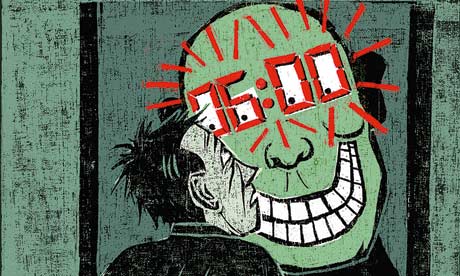
Earlier this year, two American bloggers triggered a global media convulsion by embarking on what they called a "mirror fast": covering the mirrors in their homes, and shunning mirrors elsewhere, in an effort to reduce what one of them called "the overriding self-consciousness that's taken up residence in my psyche". Since the social pressure to conform to ideals of beauty falls mainly on women, I can only guess what it's like to be so aware of one's appearance: I assume it's related to what I feel whenever a badly-angled photo reminds me how astoundingly bald I am. But for the fasters, the experiment proved a liberation. "All the other interests in my life – my goals, passions, friends, family, favourite hobbies, etc – have attracted the energy and attention I used to give to my looks," wrote Kjerstin Gruys, while Autumn Whitefield-Madrano said she felt "calmer and more serene". They'd pulled off an ingenious psychological trick. In a world obsessed with appearances, it's impractical just to decide you're going to think differently. What they'd done, instead, was to deny themselves the feedback that fuelled the fixation.
Which is striking, because almost every other approach to health and happiness assumes the opposite: that more feedback is always good. The way to get fit, we're told, is to track miles jogged and weights lifted; to get slim, you track calories; and the first law of time management is to keep a detailed log, to see what you're really doing with your day. Reflecting an increasingly popular approach, the website moodscope.com uses mood-tracking to combat depression. There's an entire "personal informatics" movement, mentioned here previously, whose members use smartphones and other devices to turn their lives into data, so as to identify patterns and make improvements. (Join the fun at quantifiedself.com.) But mirror fasts are a reminder that more feedback isn't necessarily for the best.
In a parallel exercise last month, Steven Corona, a tech entrepreneur from South Carolina, "unsubscribed from the clock": "I dropped my watch right into the garbage. Shut off the glowing green-blue digital clocks that seem to piggyback on every appliance known to man..." He switched his iPhone to a random time zone (and did, he admits, continue to use its calendar to notify him of appointments). Much mockery followed: clock-fasting, critics rightly noted, wasn't an option for those who had to show up at an office by 9am daily. Still, as a compulsive watch-checker, I was inspired. After a few disorienting days, Corona says, his stress levels plummeted; he lost himself in projects, and learned to "read the sun". Insomniacs are advised to hide their clocks, because what doctors call "nocturnal time-monitoring behaviour" is relaxation's greatest foe. Corona simply took that principle to its conclusion.
You, of course, may have no hang-ups about mirrors or clocks. But it can be illuminating to ask if you've got other sources of feedback you might be better off without. Bathroom-scale readings? Bank-balance checking? All have their place. But all are also subject to the problem with personal feedback: once you've developed the habit of measuring something, it's hard to resist the conclusion that that thing matters. Maybe it doesn't. (And even if it does, maybe intuition would serve you better.) Sometimes, there may be data about ourselves we're better off not knowing.
oliver.burkeman@theguardian.com
Follow Oliver on Twitter.

